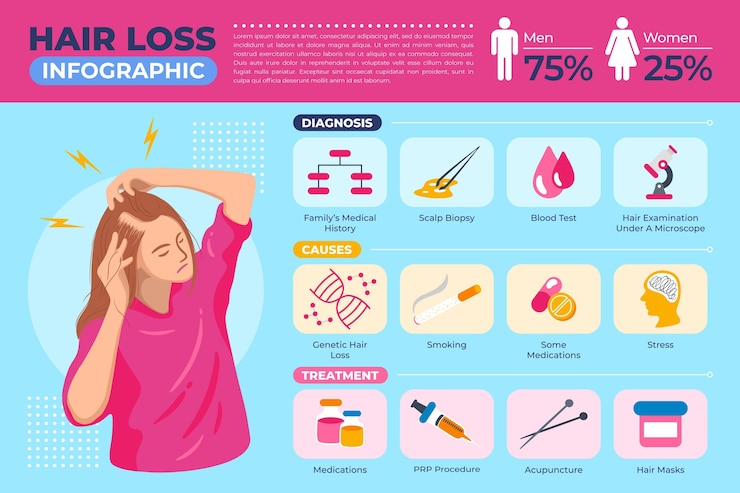
Recognizing stress-related signs is crucial because some symptoms, like hair loss, often go unnoticed. It’s surprising how significant stress’s impact can be on hair health. Stress doesn’t just affect your digestion and emotions; it can also lead to hair issues such as loss, breakage, and an itchy scalp. It’s wise to take steps to manage stress before these symptoms manifest. If you do experience them, stress might be the underlying cause of your hair problems.
**Warning Signs That Stress is Damaging Your Hair**
1. **Constantly Itchy Scalp**:
If you find yourself frequently scratching your scalp, stress might be a contributing factor. Stress elevates certain hormones and chemicals that can compromise scalp health, causing dryness and irritation. To manage a stress-induced itchy scalp, consider reducing your stress levels and washing your hair less often to allow natural oils to nourish your scalp. Switching to gentle, sulfate-free hair products can also help.
2. **Hair Loss or Thinning**:
Stress could be the reason behind hair loss or thinning. It’s advisable to consult a healthcare professional to rule out other serious conditions like Alopecia Areata or Telogen Effluvium. Stress-related hair loss occurs because it restricts blood flow, depriving hair follicles of essential nutrients. Note that hair loss can happen months after a stressful event, so ongoing stress management is key to preventing future damage.
3. **Scalp Eczema (Seborrheic Dermatitis)**:
If you’re suffering from scalp eczema, stress could be a trigger. Stress creates an inflammatory environment, weakening the skin’s barrier and hindering healing. Managing stress, alongside dietary adjustments to avoid allergens, can alleviate symptoms. Consider trying stress-reducing techniques and consulting resources like the Eczema Healing Guide.
4. **Premature Graying**:
Although stress isn’t a direct cause of gray hair, it can accelerate the process if you’re genetically predisposed. Stress can deplete melanin, the pigment responsible for hair color, faster. Nutritional deficiencies may also be a factor, so consulting a healthcare practitioner can help ensure you’re getting the right nutrients.
**Tips to Lower Stress (and Protect Your Hair)**
1. **Stay Active**:
Regular physical activity can significantly reduce stress, thanks to the endorphins released during exercise. Find an activity you enjoy to help make it a consistent and pleasurable part of your routine.
2. **Practice Deep Breathing**:
Deep breathing is an accessible and effective way to manage stress. Incorporate it into your daily routine, especially during stressful moments, to help calm your mind and body.
3. **Prioritize Self-Care**:
Consistent self-care is vital for stress management. Whether it’s saying “no” when necessary, enjoying a relaxing bath, or spending time in nature, make self-care a regular practice.
4. **Include Adaptogens**:
Adaptogens, natural substances from plants, can help your body manage stress better. They include ashwagandha, holy basil, and reishi mushrooms, which can be incorporated into your diet in various forms.
5. **Spend Time Outdoors**:
Nature can have a calming effect on the mind. Make it a habit to spend time outside regularly to help alleviate stress and improve your mood.
Have you noticed improvements in your hair health by reducing stress? Share your experiences!
—
If you’re concerned about hair loss, like Natalie, seeing a healthcare professional can help identify any underlying issues. Reducing stress can have a positive impact on your hair and overall health, as Kim found. Remember, while hair loss can be alarming, there are effective ways to manage stress and protect your hair.
If you’re curious about supplements or hair treatments, consider exploring natural options like rosemary oil, and discuss with a healthcare provider to ensure they fit your needs. Participating in initiatives like the Natural Hair Care Challenge might also provide helpful insights and support.


